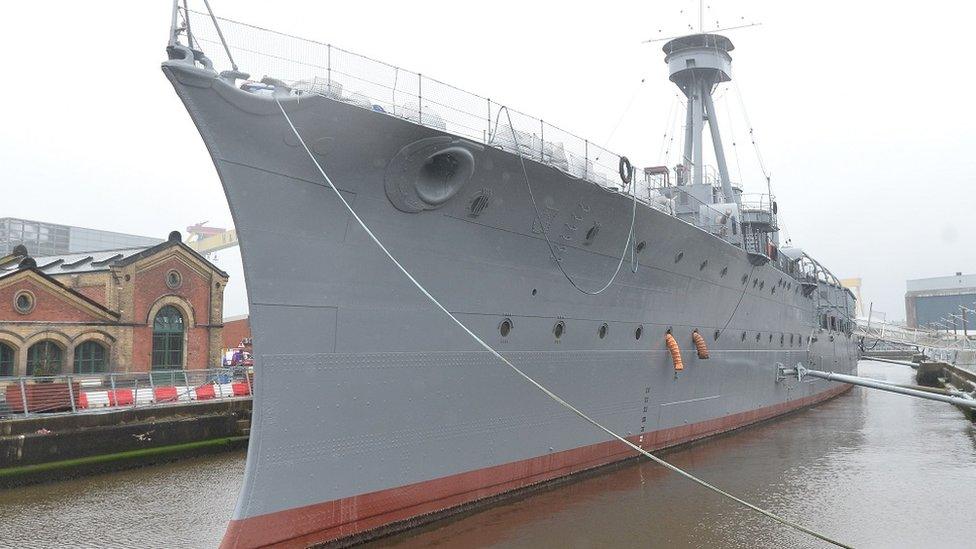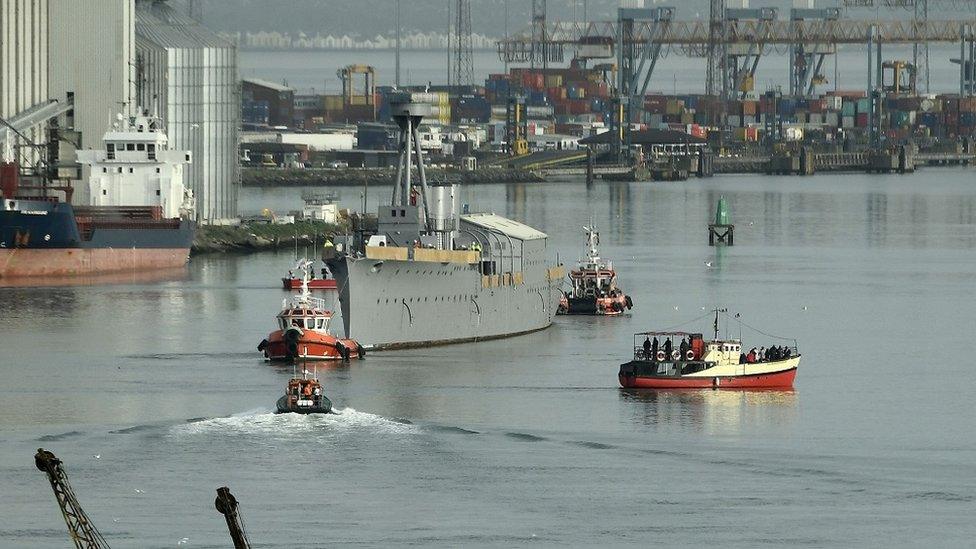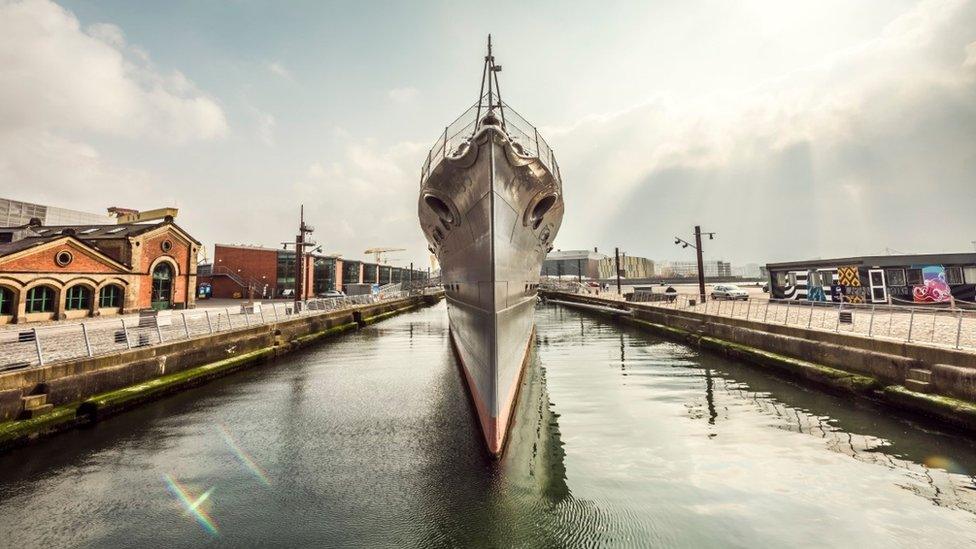HMS Caroline will not reopen until 2021 due to funding shortfall
- Published

The World War One warship HMS Caroline will not reopen to the public until next year due to a funding shortfall, the operator has said.
The vessel is the sole surviving ship from the 1916 Battle of Jutland, the biggest sea battle of the conflict.
The National Museum of the Royal Navy (NMRN) said the Covid-19 closure had left a shortfall of £6.35m.
It claimed an operations and funding agreement could not be reached with the NI Department for the Economy (DfE).
NMRN, which operates HMS Caroline on behalf of the Northern Ireland executive, warned jobs could be lost if the situation is not rectified.
The operational agreement for HMS Caroline - which was shortlisted for the 2019 Art Fund Museum of the Year award - expired on 30 June, leaving the museum unable to go on operating the ship.
In a statement, the NMRN said the organisation has been under "extraordinary financial pressure", with a funding gap of in excess of £6m.
NMRN temporarily closed the ship, in Belfast's Titanic Quarter, on the 17 March in line with public health advice.
It also closed its sites in Portsmouth, Gosport, Hartlepool and Yeovilton.
It will now reopen these sites "thanks to an emergency grant from HM Treasury", but said an agreement has not been reached with the DfE.
The NMRN said the funding model for HMS Caroline is different.
'DfE chose to mothball ship'
"Whilst the ship is owned by NMRN, it is opened to the public through an operator agreement made with the Department for the Economy in NI, " it said.
"NMRN operates the ship seeking to maximise income to cover costs, but if there is any shortfall, then the DfE guarantees to pay the excess.
"This agreement has been in place since the ship reopened in 2016 until 30 June 2020 when it expired, and means the responsibility for the operation of the ship has now fallen back to DfE."
The statement added that the operator had "worked extensively" with DfE to set up a new operational agreement and to "recoup the significant sums in running costs since 2016 which are still owed to the museum".
NMRN said this has not been possible and claimed the DfE has "therefore chosen to mothball the ship for six months whilst they decide what to do with it".
Possible redundancies
Dominic Tweddle, NMRN director general, said it was "a desperate situation".
He added that the body had liaised exhaustively with DfE and continue to do so in the hope it may still be reopened alongside other sites.
He said staff salaries had been supported under the Coronavirus Job Retention Scheme but "if we are not able to sway DfE from its current position then HMS Caroline will not reopen until 2021 and those jobs will have to be made redundant".
DfE, however said visitor numbers "have been disappointing to date resulting in operational deficits" at the attraction.
"The department was first informed of operational deficits in October 2018 and NMRN has still been unable to verify the totality of these," the department said.
"This was unexpected as the original business plan indicated no deficits would occur on the project until 2022/23."
The department said it has engaged external consultants to establish and confirm the totality of this deficit, with a report expected in August.
"However, to help with cash-flow issues during the Covid-19 crisis, the department has already made a substantial interim payment to NMRN," it added.
"The agreement that the department had with NMRN to operate the attraction expired on 30 June, 2020. The NMRN took the decision not to renew this agreement without a revised funding model being put in place and they notified the department of this on 10 June 2020.
"This did not leave sufficient time for the department to formulate a new funding model, redraft a new operating agreement or to procure a new operator of the attraction."
The department said it agreed with NMRN to extend the current period of closure to 31 December 2020, and will use the period to examine all options.
"The department has also advised NMRN that it will meet agreed costs associated with this period of temporary closure, which include salary costs of two members of staff who will be maintaining and overseeing the ship during this time. The remainder of the HMSC staff are currently on furlough through the Job Retention Scheme," it added.
Ulster Unionist leader Steve Aiken, who is a former Royal Navy submariner and captain, started his career on HMS Caroline in 1978 when he was 16.
He said the situation was "scandalous" adding that he did not believe it was a funding issue.
"The department is pushing to get our tourism up and running, so why this? There is something that just doesn't connect up here," he told BBC Talkback.

What is HMS Caroline?
Built in 1914 in Birkenhead in England, HMS Caroline was one of the fastest warships of its time.
The Battle of Jutland - off the coast of Denmark - involved some 250 ships from the Royal Navy's Grand Fleet and the German High Seas Fleet.

More than 8,500 sailors lost their lives in the 12-hour battle on 31 May and 1 June 1916.
After the war, HMS Caroline was berthed in Belfast as a training ship, but also saw service in World War Two.
There were fears at one point that the ship would be moved from Belfast after it was decommissioned as a Royal Navy training vessel in 2011.
However, about £15m of funding enabled it to stay in the city and open as a floating museum.
The living quarters of the captain, officers and ratings as well as the signal school, engine room, sick bay and galley were all intact but were restored and opened to the public.
A further restoration of the Alexandra Dock - where it is moored - and the nearby Pump House in Titanic Quarter was completed in 2018.
It was shortlisted for the 2019 Art Fund Museum of the Year award.

- Published26 April 2019
